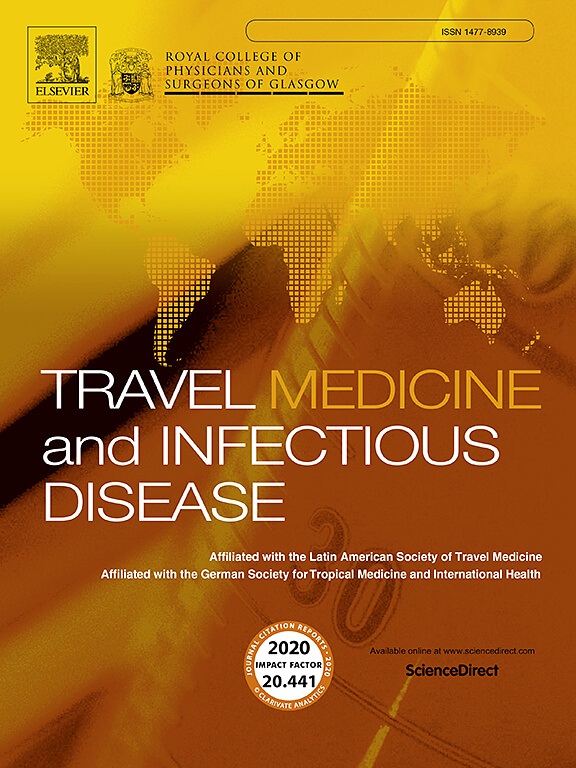Metagenomic next-generation sequencing enhances the diagnosis of Q fever: A retrospective observational study
IF 4.7
3区 医学
Q1 INFECTIOUS DISEASES
引用次数: 0
Abstract
Background
Q fever, a global zoonosis, poses a significant challenge for public health due to its varied and nonspecific clinical presentations, making diagnosis difficult. Metagenomic next-generation sequencing (mNGS) is a potential tool for diagnosing Q fever.
Methods
This retrospective observational study was conducted on patients with Q fever admitted to Peking University People's Hospital, from May 2023 to November 2024. mNGS was performed using the patient's peripheral blood, and the qPCR of Coxiella burnetii was also adopted. Subsequently, the clinical data of patients diagnosed with Q fever were systematically evaluated.
Results
Twelve peripheral blood samples of 12 patients were detected Coxiella burnetii positive by mNGS. Most patients were male (10, 83.33 %). Fever (12, 100 %), muscle soreness (8, 66.7 %), and headache (4, 33.3 %) were the most common clinical manifestations. Specific qPCR of Coxiella burnetii was detected positive in 8 patients. Chronic Q fever was diagnosed in two patients, who had aortic valve replacement, and their immunological markers, like anti-nuclear were elevated. Once the diagnosis was clear, proper antibiotics were used, and all patients were discharged in better health.
Conclusion
Metagenomic next-generation sequencing enhances the diagnosis of Q fever, especially for patients displaying atypical and various clinical symptoms and having unclear epidemiological data or histories of antibiotic use.
新一代宏基因组测序提高Q热的诊断:一项回顾性观察研究
发热是一种全球性的人畜共患病,由于其多种多样和非特异性的临床表现,使诊断困难,对公共卫生构成重大挑战。元基因组新一代测序(mNGS)是诊断Q热的潜在工具。方法对2023年5月至2024年11月北京大学人民医院收治的Q热患者进行回顾性观察研究。采用患者外周血进行mNGS检测,同时采用伯纳蒂克希菌qPCR检测。随后对诊断为Q热患者的临床资料进行系统评价。结果12例患者12份外周血mNGS检出伯纳氏杆菌阳性。患者以男性居多(10,83.33%)。发热(12.100%)、肌肉酸痛(8.66.7%)和头痛(4.33.3%)是最常见的临床表现。8例患者伯纳蒂克希菌qPCR检测阳性。慢性Q热诊断在两例患者,谁做了主动脉瓣置换术,和他们的免疫标志物,如抗核升高。一旦诊断明确,就使用了适当的抗生素,所有患者都健康出院。结论新一代宏基因组测序可提高Q热的诊断,特别是对表现不典型、临床症状多样、流行病学资料或抗生素使用史不清楚的患者。
本文章由计算机程序翻译,如有差异,请以英文原文为准。
求助全文
约1分钟内获得全文
求助全文
来源期刊

Travel Medicine and Infectious Disease
PUBLIC, ENVIRONMENTAL & OCCUPATIONAL HEALTH-INFECTIOUS DISEASES
CiteScore
19.40
自引率
1.70%
发文量
211
审稿时长
49 days
期刊介绍:
Travel Medicine and Infectious Disease
Publication Scope:
Publishes original papers, reviews, and consensus papers
Primary theme: infectious disease in the context of travel medicine
Focus Areas:
Epidemiology and surveillance of travel-related illness
Prevention and treatment of travel-associated infections
Malaria prevention and treatment
Travellers' diarrhoea
Infections associated with mass gatherings
Migration-related infections
Vaccines and vaccine-preventable disease
Global policy/regulations for disease prevention and control
Practical clinical issues for travel and tropical medicine practitioners
Coverage:
Addresses areas of controversy and debate in travel medicine
Aims to inform guidelines and policy pertinent to travel medicine and the prevention of infectious disease
Publication Features:
Offers a fast peer-review process
Provides early online publication of accepted manuscripts
Aims to publish cutting-edge papers
 求助内容:
求助内容: 应助结果提醒方式:
应助结果提醒方式:


